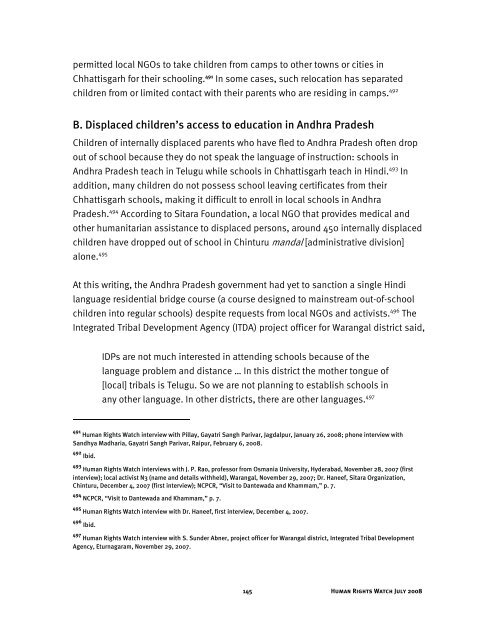âBeing Neutral is Our Biggest Crimeâ - Global Coalition to Protect ...
âBeing Neutral is Our Biggest Crimeâ - Global Coalition to Protect ...
âBeing Neutral is Our Biggest Crimeâ - Global Coalition to Protect ...
You also want an ePaper? Increase the reach of your titles
YUMPU automatically turns print PDFs into web optimized ePapers that Google loves.
permitted local NGOs <strong>to</strong> take children from camps <strong>to</strong> other <strong>to</strong>wns or cities in<br />
Chhatt<strong>is</strong>garh for their schooling. 491 In some cases, such relocation has separated<br />
children from or limited contact with their parents who are residing in camps. 492<br />
B. D<strong>is</strong>placed children’s access <strong>to</strong> education in Andhra Pradesh<br />
Children of internally d<strong>is</strong>placed parents who have fled <strong>to</strong> Andhra Pradesh often drop<br />
out of school because they do not speak the language of instruction: schools in<br />
Andhra Pradesh teach in Telugu while schools in Chhatt<strong>is</strong>garh teach in Hindi. 493 In<br />
addition, many children do not possess school leaving certificates from their<br />
Chhatt<strong>is</strong>garh schools, making it difficult <strong>to</strong> enroll in local schools in Andhra<br />
Pradesh. 494 According <strong>to</strong> Sitara Foundation, a local NGO that provides medical and<br />
other humanitarian ass<strong>is</strong>tance <strong>to</strong> d<strong>is</strong>placed persons, around 450 internally d<strong>is</strong>placed<br />
children have dropped out of school in Chinturu mandal [admin<strong>is</strong>trative div<strong>is</strong>ion]<br />
alone. 495<br />
At th<strong>is</strong> writing, the Andhra Pradesh government had yet <strong>to</strong> sanction a single Hindi<br />
language residential bridge course (a course designed <strong>to</strong> mainstream out-of-school<br />
children in<strong>to</strong> regular schools) despite requests from local NGOs and activ<strong>is</strong>ts. 496 The<br />
Integrated Tribal Development Agency (ITDA) project officer for Warangal d<strong>is</strong>trict said,<br />
IDPs are not much interested in attending schools because of the<br />
language problem and d<strong>is</strong>tance … In th<strong>is</strong> d<strong>is</strong>trict the mother <strong>to</strong>ngue of<br />
[local] tribals <strong>is</strong> Telugu. So we are not planning <strong>to</strong> establ<strong>is</strong>h schools in<br />
any other language. In other d<strong>is</strong>tricts, there are other languages. 497<br />
491 Human Rights Watch interview with Pillay, Gayatri Sangh Parivar, Jagdalpur, January 26, 2008; phone interview with<br />
Sandhya Madharia, Gayatri Sangh Parivar, Raipur, February 6, 2008.<br />
492 Ibid.<br />
493 Human Rights Watch interviews with J. P. Rao, professor from Osmania University, Hyderabad, November 28, 2007 (first<br />
interview); local activ<strong>is</strong>t N3 (name and details withheld), Warangal, November 29, 2007; Dr. Haneef, Sitara Organization,<br />
Chinturu, December 4, 2007 (first interview); NCPCR, “V<strong>is</strong>it <strong>to</strong> Dantewada and Khammam,” p. 7.<br />
494 NCPCR, “V<strong>is</strong>it <strong>to</strong> Dantewada and Khammam,” p. 7.<br />
495 Human Rights Watch interview with Dr. Haneef, first interview, December 4, 2007.<br />
496 Ibid.<br />
497 Human Rights Watch interview with S. Sunder Abner, project officer for Warangal d<strong>is</strong>trict, Integrated Tribal Development<br />
Agency, Eturnagaram, November 29, 2007.<br />
145<br />
Human Rights Watch July 2008
















